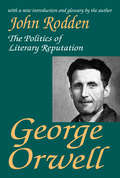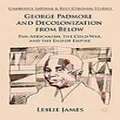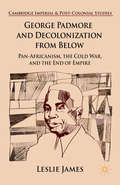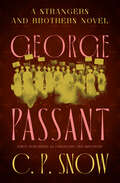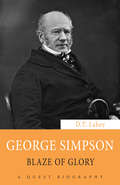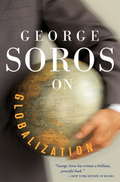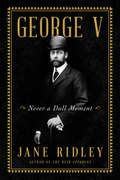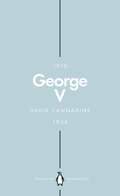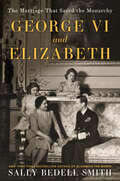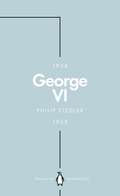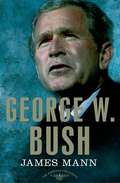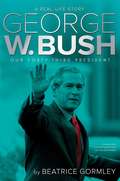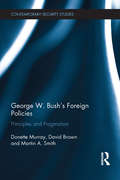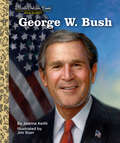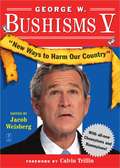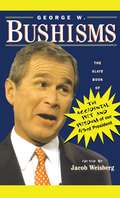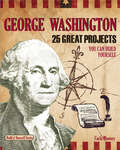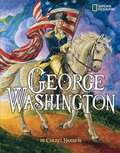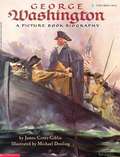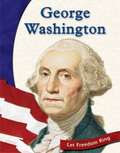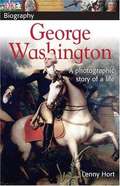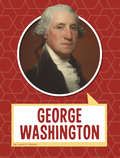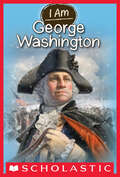- Table View
- List View
George Orwell: The Politics of Literary Reputation
by John RoddenThe making of literary reputations is as much a reflection of a writer's surrounding culture and politics as it is of the intrinsic quality and importance of his work. The current stature of George Orwell, commonly recognized as the foremost political journalist and essayist of the century, provides a notable instance of a writer whose legacy has been claimed from a host of contending political interests. The exemplary clarity and force of his style, the rectitude of his political judgment along with his personal integrity have made him, as he famously noted of Dickens, a writer well worth stealing. Thus, the intellectual battles over Orwell's posthumous career point up ambiguities in Orwell's own work as they do in the motives of his would-be heirs. John Rodden's George Orwell: The Politics of Literary Reputation, breaks new ground in bringing Orwell's work into proper focus while providing much original insight into the phenomenon of literary fame.Rodden's intent is to clarify who Orwell was as a writer during his lifetime and who he became after his death. He explores the dichotomies between the novelist and the essayist, the socialist and the anti-communist and the contrast between his day-to-day activities as a journalist and his latter-day elevation to political prophet and secular saint. Rodden's approach is both contextual and textual, analyzing available reception materials on Orwell along with audiences and publications decisive for shaping his reputation. He then offers a detailed historical and biographical interpretation of the reception scene analyzing how and why did individuals and audiences cast Orwell in their own images and how these projected images served their own political needs and aspirations. Examined here are the views of Orwell as quixotic moralist, socialist renegade, anarchist, English patriot, neo-conservative, forerunner of cultural studies, and even media and commercial star. Rodden concludes with a consideration of the meaning of Or
George Padmore and Decolonization from Below
by Leslie JamesFrom his base in London, the Trinidad-born Marxist, George Padmore, was a central figure ofmid-twentieth century pan-Africanism who became critically involved in debates about thenature and practice of European imperialism. Focusing on Padmore's political manoeuvring, Leslie James traces his politics through the ongoing influence of the Caribbean and thelegacy of the Garvey movement; the international communist movement and Sovietdecolonization; debates about fascism and colonialism; the new 'reform' rhetoric apparentin World War II; the beginnings of the Cold War; and, pivotally, post-war African politicsthat confronted a wealth of new dynamics including independent Ghana, apartheid SouthAfrica, and the Mau Mau Emergency in Kenya. Within the ideas and political practice of thisforthright man lie a number of common questions about the circulation of ideas, the shapeof black radical thought, and the weight of Cold War politics within the modern history ofEuropean imperialism and the end of empire.
George Padmore and Decolonization from Below: Pan-Africanism, the Cold War, and the End of Empire (Cambridge Imperial and Post-Colonial Studies Series)
by L. JamesThis book argues that the rising tide of anti-colonialism after the 1930s should be considered a turning point not just in harnessing a new mood or feeling of unity, but primarily as one that viewed empire, racism, and economic degradation as part of a system that fundamentally required the application of strategy to their destruction.
George Passant (The Strangers and Brothers Novels)
by C.P. SnowA wise, moving novel about a mentor and his protégé: &“The central character . . . is immensely appealing . . . a peculiarly haunting and sympathetic figure.&” —The New York Times In late 1920s England, Lewis Eliot is building a career in law and has found a mentor in George Passant. The quirky small-town solicitor&’s clerk has much wisdom to share from his years of experience—during which he has also managed to hold on to his idealism. Eliot is just one of the many young devotees drawn to Passant, hoping for guidance from the man who&’s always ready to extend a loan or a listening ear. However, the young men will have to learn to fly on their own—and come to Passant&’s aid themselves—in this absorbing novel by &“an extremely shrewd observer of men and society&” (Commentary). &“An enlightened discussion of questions of conscience and conduct and commitment. . . . Filled with the concerns which are so fundamentally and essentially a part of this writer&’s work and have attracted a firm following.&” —Kirkus ReviewsOriginally published under the title Strangers and Brothers
George Simpson: Blaze of Glory
by D. T. LaheyBorn in Scotland and trained as a sugar broker in London, England, Sir George Simpson (1792-1860) was unexpectedly appointed in 1820 as governor of Rupert’s Land and the Indian territories, an area encompassing all of Canada from Hudson Bay to the Pacific Ocean. By his friendliness of manner, strict discipline, and vigorous and constant travel, he brought peace and prosperity to the vast empire under his control.Simpson’s explorations opened Canada from Labrador to British Columbia and from Yukon to Nunavut. He was knighted in 1841, then travelled around the world, predicting the fall of California to the United States, saving the Hawaiians from colonial occupation, and describing the mysteries of remotest Siberia. Praised as the governor who "combined the widest range of authority and the longest tenure of power ever enjoyed by one man in North America," he stands with Sir John A. Macdonald as one of the greatest Makers of Canada.
George Soros On Globalization
by George SorosNow in paperback: George Soros' powerful and brilliant report on the state of our international institutions (New York Review of Books)
George V: Never a Dull Moment
by Jane RidleyFrom one of the most beloved and distinguished historians of the British monarchy, here is a lively, intimately detailed biography of a long-overlooked king who reimagined the Crown in the aftermath of World War I and whose marriage to the regal Queen Mary was an epic partnershipThe grandfather of Queen Elizabeth II, King George V reigned over the British Empire from 1910 to 1936, a period of unprecedented international turbulence. Yet no one could deny that as a young man, George seemed uninspired. As his biographer Harold Nicolson famously put it, "he did nothing at all but kill animals and stick in stamps.” The contrast between him and his flamboyant, hedonistic, playboy father Edward VII could hardly have been greater.However, though it lasted only a quarter-century, George’s reign was immensely consequential. He faced a constitutional crisis, the First World War, the fall of thirteen European monarchies and the rise of Bolshevism. The suffragette Emily Davison threw herself under his horse at the Derby, he refused asylum to his cousin the Tsar Nicholas II during the Russian Revolution, and he facilitated the first Labour government. And, as Jane Ridley shows, the modern British monarchy would not exist without George; he reinvented the institution, allowing it to survive and thrive when its very existence seemed doomed. The status of the British monarchy today, she argues, is due in large part to him.How this supposedly limited man managed to steer the crown through so many perils and adapt an essentially Victorian institution to the twentieth century is a great story in itself. But this book is also a riveting portrait of a royal marriage and family life. Queen Mary played a pivotal role in the reign as well as being an important figure in her own right. Under the couple's stewardship, the crown emerged stronger than ever. George V founded the modern monarchy, and yet his disastrous quarrel with his eldest son, the Duke of Windsor, culminated in the existential crisis of the Abdication only months after his death.Jane Ridley has had unprecedented access to the archives, and for the first time is able to reassess in full the many myths associated with this crucial and dramatic time. She brings us a royal family and world not long vanished, and not so far from our own.
George V: The Unexpected King (Penguin Monarchs)
by David CannadineFor a man with such conventional tastes and views, George V had a revolutionary impact. Almost despite himself he marked a decisive break with his flamboyant predecessor Edward VII, inventing the modern monarchy, with its emphasis on frequent public appearances, family values and duty. George V was an effective war-leader and inventor of 'the House of Windsor'. In an era of ever greater media coverage--frequently filmed and initiating the British Empire Christmas broadcast--George became for 25 years a universally recognised figure. He was also the only British monarch to take his role as Emperor of India seriously. While his great rivals (Tsar Nicolas and Kaiser Wilhelm) ended their reigns in catastrophe, he plodded on.David Cannadine's sparkling account of his reign could not be more enjoyable, a masterclass in how to write about Monarchy, that central--if peculiar--pillar of British life.
George VI and Elizabeth: The Marriage That Saved the Monarchy
by Sally Bedell SmithA revelatory account of how the loving marriage of King George VI and Queen Elizabeth saved the monarchy during World War II, and how they raised their daughter to become Queen Elizabeth II, based on exclusive access to the Royal Archives—from the bestselling author of Elizabeth the Queen and Prince Charles&“An intimate and gripping portrait of a royal marriage that survived betrayal, tragedy, and war.&”—Amanda Foreman, bestselling author of Georgiana: Duchess of DevonshireGranted special access by Queen Elizabeth II to her parents&’ letters and diaries and to the papers of their close friends and family, Sally Bedell Smith brings the love story of this iconic royal couple to vibrant life. This deeply researched and revealing book shows how a loving and devoted marriage helped the King and Queen meet the challenges of World War II, lead a nation, solidify the public&’s faith in the monarchy, and raise their daughters, Princess Elizabeth and Princess Margaret.When King Edward VIII abdicated the throne in 1936, shattering the Crown&’s reputation, his younger brother, known as Bertie, assumed his father&’s name and became King George VI. Shy, sensitive, and afflicted with a stutter, George VI had never imagined that he would become King. His wife, Elizabeth, a pretty, confident, and outgoing woman who became known later in life as &“the Queen Mum,&” strengthened and advised her husband. With his wife&’s support, guidance, and love, George VI was able to overcome his insecurities and become an exceptional leader, navigating the country through World War II, establishing a relationship with Winston Churchill, visiting Franklin and Eleanor Roosevelt in Washington and in Hyde Park, and inspiring the British people with his courage and compassion during the Blitz. Simultaneously, George VI and Elizabeth trained their daughter Princess Elizabeth from an early age to be a highly successful monarch, and she would reign for an unprecedented seventy years.Sally Bedell Smith gives us an inside view of the lives, struggles, hopes, and triumphs of King George VI and Elizabeth during a dramatic time in history.
George VI: The Dutiful King (Penguin Monarchs)
by Philip ZieglerWritten by Philip Ziegler, one of Britain's most celebrated biographers, George VI is part of the Penguin Monarchs series: short, fresh, expert accounts of England's rulers in a collectible formatIf Ethelred was notoriously 'Unready' and Alfred 'Great', King George VI should bear the title of 'George the Dutiful'. Throughout his life, George dedicated himself to the pursuit of what he thought he ought to be doing rather than what he wanted to do. Inarticulate and loathing any sort of public appearances, he accepted that it was his destiny to figure conspicuously in the public eye, gritted his teeth, battled his crippling stammer and got on with it. He was not born to be king, but he made an admirable one, and was the figurehead of the nation at the time of its greatest trial, the Second World War. This is a brilliant, touching and sometimes funny book about this reluctant public figure, and the private man.Philip Ziegler is the author of the authorised biographies of Mountbatten, Harold Wilson and Edward Heath. His other books include The Duchess of Dino, William IV, The Black Death and most recently Olivier. Initially a diplomat, he worked for many years in book publishing before becoming a full-time writer.
George W. Bush
by James Mann Arthur M. Schlesinger Sean WilentzThe controversial president whose time in office was defined by the September 11 attacks and the war on terror George W. Bush stirred powerful feelings on both sides of the aisle. Republicans viewed him as a resolute leader who guided America through the September 11 attacks and retaliated in Afghanistan and Iraq, while Democrats saw him as an overmatched president who led America into two inconclusive wars that sapped the nation's resources and diminished its stature. When Bush left office amid a growing financial crisis, both parties were eager to move on. In this assessment of the nation's forty-third president, James Mann sheds light on why George W. Bush made the decisions that shaped his presidency, what went wrong, and how the internal debates and fissures within his administration played out in such a charged atmosphere. He shows how and why Bush became such a polarizing figure in both domestic and foreign affairs, and he examines the origins and enduring impact of Bush's most consequential actions-including Iraq, the tax cuts, and the war on terror. In this way, Mann points the way to a more complete understanding of George W. Bush and his times.
George W. Bush
by Beatrice GormleyLearn about the life of the 43rd President of the United States in this updated biography of George W. Bush, specially written for a younger audience.President George W. Bush once said, "I never dreamed about becoming president. When I was growing up, I wanted to be Willie Mays." George W. was born July 6, 1946, in New Haven, Connecticut. He grew up in Texas but returned to Connecticut to attend Yale University. As a young man he trained as a fighter pilot in the Texas Air National Guard before beginning a career in business. He entered Texas politics and served as the state's governor from 1994 to 2000. In 2001 George W. Bush won one of the closest, and most disputed, presidential elections in United States history. During his first term Bush launched a war against terrorism after the devastating attacks of September 11, 2001. In 2004 he won his second term against John Kerry. Originally published as President George W. Bush in 2005, this revised biography of the 43rd President of the United States includes eight pages of photos as well as a timeline and index.
George W. Bush's Foreign Policies: Principles and Pragmatism (Contemporary Security Studies)
by David Brown Martin A. Smith Donette MurrayThis book offers a fresh assessment of George W. Bush’s foreign policies. It is not designed to offer an evaluation of the totality of George W. Bush’s foreign policy. Instead, the analysis will focus on the key aspects of his foreign and security policy record, in each case considering the interplay between principle and pragmatism. The underpinning contention here is that policy formulation and implementation across Bush’s two terms can more usefully be analysed in terms of shades of grey, rather than the black and white hues in which it has often been painted. Thus, in some key policy areas it will be seen that the overall record was more pragmatic and successful than his many critics have been prepared to give him credit for. The president and his advisers were sometimes prepared to alter and amend their policy direction, on occasion significantly. Context and personalities, interpersonal and interagency, both played a role here. Where these came together most visibly – for instance in connection with dual impasses over Iraq and Iran – exigencies on the ground sometimes found expression in personnel changes. In turn, the changing fortunes of Bush’s first term principals presaged policy changes in his second. What emerges from a more detached study of key aspects of the Bush administration – during a complicated and challenging period in the United States’ post-Cold War history, marked by the dramatic emergence of international Islamist terrorism as the dominant international security threat – is a more complex picture than any generalization can ever hope to sustain, regardless of how often it is repeated. This book will be of much interest to students of US foreign policy, international politics and security studies.
George W. Bush: A Little Golden Book Biography (Little Golden Book)
by Joanna KeithHelp your little one dream big with a Little Golden Book biography all about President George W. Bush! The perfect introduction to nonfiction for preschoolers! This Little Golden Book about George W. Bush--the forty-third president of the United States and a talented artist--is an inspiring read-aloud for young readers. Look for more Little Golden Book biographies: • John McCain • My LGB About the White House • My LGB About Johnny Appleseed
George W. Bushisms V
by Calvin Trillin Jacob Weisberg"I can only speak to myself." True -- and yet we must listen. Sometimes his accidental wit speaks louder than any prepared statement. "Our enemies are innovative and resourceful, and so are we. They never stop thinking about new ways to harm our country and our people, and neither do we." "I always jest to people, the Oval Office is the kind of place where people stand outside, they're getting ready to come in and tell me what for, and they walk in and get overwhelmed by the atmosphere. And they say, 'Man, you're looking pretty.'" "I'm honored to shake the hand of a brave Iraqi citizen who had his hand cut off by Saddam Hussein." Thanks to the faithful work of Jacob Weisberg, the wisdom of George W. Bush -- America's Malapropist in Chief -- has been carefully preserved for the ages in annual editions. Now that the president is armed with a new (and unprecedented!) popular electoral victory, America can breathe a sigh of relief -- or, as the president once put it, we can "thank our blessings." The language experiments will continue. Stand-up comedians will enjoy full employment. With George W. Bushisms V, the second term truly begins.
George W. Bushisms: The Slate Book of Accidental Wit and Wisdom of Our 43rd President
by Jacob Weisberg"They misunderestimated me." Or did they? Judge for yourself. Here are over 100 memorable misstatements by our syntactically challenged president, collected, annotated, and introduced by Slate magazine's Jacob Weisberg. "I know the human being and fish can coexist peacefully." "Families is where our nation finds hope, where wings take dream." "We'll let our friends be the peacekeepers and the great country called America will be the pacemakers." "It's clearly a budget. It's got a lot of numbers in it." "I know how hard it is for you to put food on your family." "I do know I'm ready for the job [the presidency]. And if not, that's just the way it goes."
George Washington
by Samuel Carbaugh Carla MooneyGeorge Washington: 25 Great Projects You Can Build Yourself offers a fascinating look into the life and times of our nation's first president. Readers ages 9 and up can explore Washington's years as a young Virginia gentleman, his military battles, and his political contributions to a fledgling nation. 25 hands-on activities help kids learn about this legendary figure in American history. George Washington: 25 Great Projects You Can Build Yourself includes biographical sidebars, illustrations, historical facts that allow kids to explore George Washington in a fun, hands-on way.
George Washington
by Samuel Carbaugh Carla MooneyGeorge Washington: 25 Great Projects You Can Build Yourself offers a fascinating look into the life and times of our nation's first president. Readers ages 9 and up can explore Washington's years as a young Virginia gentleman, his military battles, and his political contributions to a fledgling nation. 25 hands-on activities help kids learn about this legendary figure in American history. George Washington: 25 Great Projects You Can Build Yourself includes biographical sidebars, illustrations, historical facts that allow kids to explore George Washington in a fun, hands-on way.
George Washington
by Cheryl HarnessPresents the life of George Washington, focusing on the Revolutionary War years and his presidency
George Washington
by James Cross GiblinExamines the family, life, and career of the first American president, and also discusses the myths and legends surrounding him, the monuments to Washington, and Mount Vernon.
George Washington
by Kristin Thoennes KellerFollows the life of the revered leader George Washington. Covers Washington's childhood on a farm and his early lessons on being a gentleman to his experience in the French and Indian War, his military leadership in the Revolutionary War, and finally, his role as first President of the United States.
George Washington
by Lenny HortGeorge Washington is often called the father of our country. He beat the odds to lead the Continental Army to victory in the Revolutionary War, served as first president of the United States, and then retired from public life to farm Virginia's largest plantation. In this groundbreaking new series, DK brings together fresh voices and DK design values to give readers the most information-packed, visually exciting biographies on the market today. Full-color photographs of people, places, and artifacts, and sidebars on related subjects add dimension and relevance to stories of famous lives that students will love to read. Modern scholarship and a variety of narrative approaches give today's reader a chance to explore the extraordinary worlds of George Washington and Abraham Lincoln. This new way of looking at classic subjects creates a unique reading experience that breathes life into the book-report and summer-reading repertoire.
George Washington
by Tom McgowenRecounts the life of America's first president, including his youth in Virginia, military career, role in the formation of an independent nation, and leadership of that new country.
George Washington (Biographies)
by Laura K. MurrayHow much do you know about George Washington? Find out the facts you need to know about the 1st president of the United States. You'll learn about the early life, challenges, and major accomplishments of this important American.
George Washington (I Am #5)
by Grace Norwich Anthony VanArsdaleGet to know the humble Revolutionary War general who became the first U.S. President!They said I was a leader, brave, honest, fearless, and just. My thoughts of myself were much more modest. Some Americans wanted to make me a king instead of a president. I refused because I knew that the strength of the United States and the value of liberty were more powerful than any one person—even me. I am George Washington.Celebrated war hero George Washington used his progressive ideals to become the first President of the United States, earning the nickname “Father of his Country.” Young readers will be inspired by Washington’s heroic journey to make America a better place in this biography featuring: illustrations throughouta timelinean introduction to the other people you’ll meet in the book, including Helen’s amazing teacher and the men who fell in love with hermapssidebarsa top ten list of important things to know, and more
